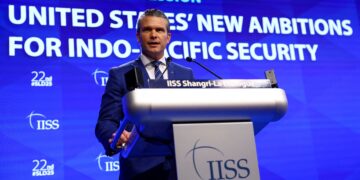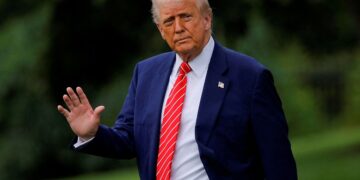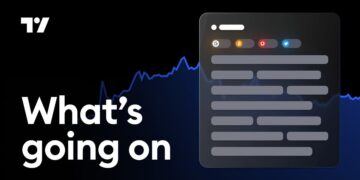By Jesús Aguado
MADRID (Reuters) -Spain’s Santander Executive Chair Ana Botin warned about the uncertainty caused by U.S. trade tariffs on Friday as markets fret about a rapid economic downturn, but said the bank’s geographical spread will help protect it.
Bank shares have tumbled in the past two days, with the European banking index down around 14% after dropping sharply again on Friday. Banks with large U.S. exposures, such as Santander and Barclays, have been among the largest fallers.
At 1522 GMT, shares in Santander, the euro zone’s biggest lender in terms of market value, were down over 8%.
“What is happening, is going to affect the economy, inflation and therefore, it is going to affect our customers, both individuals and companies,” Botin told shareholders at a virtually-held annual meeting, adding that she thought the impact would be felt more in the United States than in Europe.
However, she said the U.S., the bank’s fifth-largest market, would remain a strategic priority.
“Even if it slows down now, obviously the medium-term prospects are still very interesting.”
Botin said Santander’s geographical spread – it operates in ten core markets – would act as a stabiliser in an uncertain global environment.
Santander, like other lenders, has benefited from higher interest rates, but growth in key Latin American markets like Brazil has given it an edge over more Europe-dependent rivals.
The bank is expanding its footprint in the U.S. in areas such as corporate and investment banking.
At the same time, it is reviewing its British presence as part of a regular assessment of its major markets, a person familiar with the matter told Reuters in January.
On Friday, Botin said that Santander UK was not for sale and “at the moment we are focused on organic growth,” adding that the UK, which is the bank’s fourth-biggest market, contributed enormously to the diversification of the group.
“Having said that, obviously, we are going to evaluate organic and inorganic opportunities,” she said.
In the UK, Santander recently set aside 295 million pounds to cover possible costs related to an industry-wide probe into motor finance commissions. Botin said there was no reason at this time to review that amount.
The bank said it continued to gain customers and improved efficiency in the first quarter and was on track to meet its full-year revenue profitability and capital goals.
In the first quarter its return-on-tangible-equity ratio (ROTE), after the impact of additional Tier 1 (AT1) capital instruments, a measure of profitability, rose to 15.7%, compared to 15.5% at end of 2024, and with a target of around 16.5% this year.
The core tier-1 capital ratio is expected to have risen 10 basis points from the previous quarter to 12.9% by end-March, against a full-year target of 13%.
Investors approved the re-election of Botin and Chief Executive Hector Grisi as members of the board for three years.
($1 = 0.9112 euros)
(Reporting by Jesús Aguado, editing by Inti Landauro and Elaine Hardcastle)

















